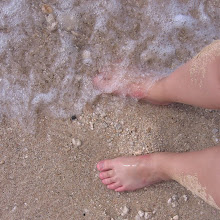Love makes your soul crawl out from its hiding place.
~ Zora Neale Hurston
Wednesday, February 24, 2010
Quote for the Day
Sunday, February 21, 2010
Book of Eli
Wednesday, February 17, 2010
On Anniversaries
Wednesday, February 10, 2010
New Glasses

This will be quick tonight, because my eyes are still blurry -- I got my vision checked today, for the first time in five years. And yes, I have new glasses. If the optometrist is right, books and papers and even the computer screen will actually be clear when I read them tomorrow (I'm guessing he doesn't mean that metaphorically though...).
Monday, February 8, 2010
Chronic Pain, Part 2
Saturday, February 6, 2010
Chronic Pain
The weather is changing here in my city -- I know, partly because the local news tells me so, and partly because I can feel the change in my body. I've had chronic pain since I was a teenager; one way I describe what this means for me is that I’m in a little bit of pain a lot of the time, and a lot of pain a little of the time – and cold fronts are one of the things that tip me towards more pain. So I’m thinking about pain tonight, in part because I’m more than just "thinking" it. But I'm also reflecting tonight on significant conversations I've had this week -- about institutional life, about primary relationships, about community -- and wondering whether chronic pain might serve not only as a metaphor for some of these experiences but also as a helpful navigational lens.
I should probably start by saying that my experience of chronic pain, while not "fun," is also not just a source of misery or regret. I suppose because I don't know life without it, it becomes yet another way that I make sense of my life. And I think it can be a helpful way of making sense of other experiences as well, particularly as we explore pain as more than just an experience of, well, pain.
The example of community is perhaps easiest to describe. Folks at my institution were talking this week about their memories of or desires for "community life," and were describing what they thought we have lost, what we lack, where we fail. I often interpret this sort of expression as a sort of grief, and even myself talk about the loss that always comes with change, even if good comes out of that change as well. I think grief is an important element, and not to be overlooked. However, the image of grief often evokes for me Kübler-Ross' model of grief, which suggests (among other things) that there is an end to the process (acceptance). In some ways, it offers the hope (and the challenge) that we will eventually "get over it."
Chronic pain, on the other hand, is something that one never gets over. At best, it can be managed, a contested site of struggle even in the midst of integration and acceptance. And yet even the language of "management" is somewhat problematic, at least in my experience. Something more like tenuous balance is perhaps a better image. Some of this is pretty tangible -- balancing exercise and rest, medication and meditation, hot packs and ice, effort and patience. It's also the intangibles -- for example, reminding myself that I can't just wallow in the pain even as I also can't just wish it away, and making space for sorrow and frustration along with serenity and hope. Some is a different sort of balance, such as learning when and how to be numb without being too numb, or numb too often. Some is about acceptance and communication -- not always fighting against the pain, and not trying to pretend (to yourself or to others) that the pain isn't there (okay, so I pretty much fail with this part!). And some is about cutting yourself a break when you "fail."
And so while grief may be an appropriate expression for discrete and concrete losses, it seems to me that the complexity of something like "community life" might instead be productively explored as a chronic condition. It is not -- and, I would venture, ought not be -- something that we ever solve, "get over," or find a place of pure acceptance, contentment, and rest. Instead, it too needs a sort of balance, of striving and resting, of critiquing and creating, of grieving and rejoicing, and of being attentive to limits -- not to mention thoroughly enjoying a trivia night while simultaneously attending to who is and isn't in the room, or listening careful as students express their sadness about a curricular change even without letting go of the vision and hope that this change will be "good." Chronic pain also carries a genuine sense of responsiveness and authentic responsibility -- I know that I can make my pain worse and can make it better, even as I also know that some of it is beyond my control. The desire for community is also like this -- it cannot simply be something we "grieve," because it is also something for which we are responsible, even as we simultaneously recognize that some of this is, and always will be, beyond our control.
I think this can be a helpful lens, for sense-making and for concrete action, as we consider institutions and relationships and other places of complexity and challenge. But it, too, is also not without risk, and even loss; at the very least, I think it leaves us quite a bit more to unpack. Yet the idea of "balance" also reminds me of time and patience, and so I think I'll say that this is enough for now (even though it is also not at all enough!). But that's what I'm thinking about tonight; I'll look forward to your thoughts as well.
Tuesday, February 2, 2010
Interconnections
The life I touch for good or ill will touch another life, and that in turn another, until who knows where the trembling stops or in what far place my touch will be felt (from The Hungering Dark, 1968).
I've been asked to do the "centering" for a meeting this morning, which typically takes the form of a story or anecdote to remind us what we are doing and why we are doing it, helping us be present and grounded as we begin our work together. We each take a turn, and this week it's mine. So this quote is what I'll bring into this meeting today, with the hope of reminding each of us in this group of the many "touches" that we overlook or ignore because we are too busy with our own to-do lists or with the noises in our own heads, forgetting to look at either the "good or ill" that travels out from us unless/until it makes a return trip and directly impacts us again.
I've been thinking about this phenomonon as I have followed the blog of Patrick and Kim Bentrott, as they have reflected on their experiences in pre- and post-earthquake Haiti. Patrick is a graduate of ours, and I remember him exploring in a class of mine (2 years ago) whether or how Sallie McFague's theology might help motivate congregations around life-and-death issues such as environmental destruction and economic injustice that were found in Haiti even then. Now, he is my teacher, particularly around the cultural/religious superiority of certain "relief" attempts and the media's linguistic stereotyping (e.g., "looting" rather than "foraging") in Haiti today. I wouldn't claim that we taught him even a fraction of what he has been teaching the world based on his experiences now, but, at the very least, it's my hope that our setting provided a place for him to develop his voice for the kind of creative, critical, engaging theological reflection that I see in their blog today. It makes me appreciative of the luxury of space, time, and resources for the conversations that we have here, knowing that we can never anticipate the impact those spaces might have on the subsequent journeys we or our students travel.
Buechner's quote is more than just this, though, and I'm not bringing it into this meeting solely as a way to feel good about our educational community (even though, reading the roster of students from that TIC-2 class, I was reminded of the impact our students have made and continue to make in the world -- you all are amazing!). Partly, my interest is in the impact we have "for good or ill" -- not forgeting that what spirals out from us can as easily be harm as it can be good. I was reminded of this yesterday by one of our students, that sometimes how we enter the building or whether or not we call people by name can be as significant as policy decisions or larger institutional commuication patterns (even though these, too, are important) [btw, thanks for that conversation, if you're reading this!].
Beyond this, though, Buechner's phrase "who knows where the trembling stops" is evocative to me, particularly as we think about our institution, not as a place of simple transactional relationships, but as one element in an interwoven tapestry of people and communities. A word spoken out of anxiety in one meeting or one e-mail affects not just those who hear that immediate message but cascades out from there into places and relationships and communities in ways that are unmeasurable. The same is true for messages of anger (we've all seen, and felt, how anger ripples out and has a residual impact on so many others), and I would propose that indifference, arrogance, and self-centeredness have similar "trembling" implications. The challenge, I think, is to explore whether or how other ways of being might similarly move forward. Partly here I think about solid senses of hope and optimism, but I'm more interested in the less certain elements of time and place and and instability and possibility, and even of emptiness, back to my theme of questions rather than answers. How do we carry forward things like risk, uncertainty, and possibility, touching lives, one after the other, in ways that embody openness and authenticity? I'm imagining here what it would be like to be in a meeting or conversation where, rather than seeming to only be about two people who are battling or positioning against each other, we instead were able to place ourselves together in what we do not know and cannot see, letting an authentic mix of possibility and uncertainty move us forward and move forward from us. What difference could that make?
So that's what I'm wondering this morning. I'll let you know whether my listeners in this meeting have any ideas, and look forward to your thoughts as well.
